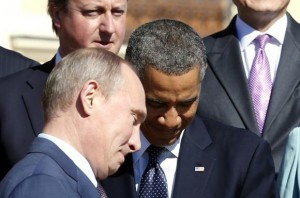 (Reuters) - The United States hopes the escalating crisis in Ukraine will not undermine cooperation with Russia to curb Iran's nuclear program, a senior U.S. administration official said on Friday.
(Reuters) - The United States hopes the escalating crisis in Ukraine will not undermine cooperation with Russia to curb Iran's nuclear program, a senior U.S. administration official said on Friday.
Senior officials from the United States, Britain, France, Germany, Russia and China are due to meet Iranian officials in Vienna next week for a new round of talks aimed at finding ways to limit Tehran's nuclear activities in exchange for ending sanctions against the Islamic Republic.
Iran denies allegations from Israel, Western powers and their allies that it is developing the capability to produce atomic weapons under cover of a civilian nuclear energy program. It has defied crippling U.S., EU and U.N. sanctions imposed on it for refusing to halt uranium enrichment.
"We all hope that the incredibly difficult situation in Ukraine will not create issues for this negotiation," the U.S. official said in a conference call from Washington.
"We hope that whatever happens in the days ahead, whatever actions that we in the international community take depending upon the decisions and the choices that Russia makes, that any actions that Russia subsequently takes will not put the negotiations at risk," the official said.
The United States and European Union have threatened to blacklist Russians involved in what Western governments say is an attempt by Russia to annex Ukraine's pro-Russian Crimea region in violation of Ukrainian and international law.
Russia shipped more troops and armor into the region on Friday, repeating its threat to invade other parts of Ukraine and showing no sign of heeding Western pleas to back off from the worst East-West confrontation since the Cold War.
U.S. and European officials have told Reuters privately that the Ukraine situation has not impacted discussions with Russia on issues like Iran and Syria. But that may change if dozens of Russians are hit with U.S. and European sanctions because of Moscow's approach to the crisis.
Earlier in the conference call, the U.S. official had spoken positively about cooperation within the so-called "P5+1" group - the five permanent U.N. Security Council members plus Germany - when dealing with Iran.
"Even when there are differences (within the P5+1), which there are, we bridge those differences," the official said. "We remain completely united when we have discussions with Iran."
Tehran and the six powers agreed in November on an interim deal under which Iran stopped medium-level uranium enrichment and agreed to other constraints in exchange for modest sanctions relief.
The six powers and Iran have set a deadline of late July to reach a long-term agreement that would lead to the gradual lifting of all nuclear-related sanctions on Tehran.
By Reuters
The Iran Project is not responsible for the content of quoted articles.

 QR code
QR code